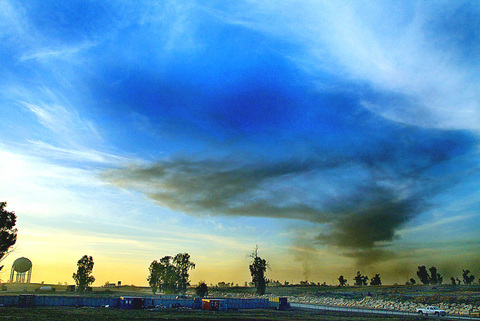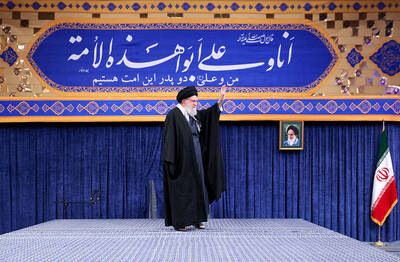Pitched battles between US troops and Iraqi insurgents in strife-torn Mosul left at least 26 dead, including one US soldier, as two Lebanese businessmen were kidnapped in Baghdad overnight.
The fresh violence came after 30 people were killed when a Baghdad house rigged with explosives blew up during a police raid.

PHOTO: AFP
Despite the volatile security situation, US President George W. Bush insisted Iraq's landmark national elections must go ahead, while a hardline Islamist militant group reiterated its intention to cause bloodshed on polling day, Jan. 30.
In the northern city of Mosul, insurgents detonated car bombs against a US patrol and a combat outpost and about 50 fighters launched an assault on the outpost, firing small arms, rocket-propelled grenades and mortars, the military said.
US forces called in air strikes and at least 25 insurgents were killed, said Lieutenant Colonel Paul Hastings.
A military statement yesterday said a US soldier died of wounds suffered in one of the car bombings.
Masked gunmen were seen running down Mosul's deserted streets, firing off guns and rocket-propelled grenades, as a column of smoke shot up into the sky.
Violence has paralyzed the city of 1.5 million, where US forces are expected to increase their numbers ahead of the elections for an Iraqi national parliament.
As the clock ticked down to the election, doubts loom over whether US and Iraqi forces can pacify cities like Mosul, a bastion of the Sunni Muslim minority whose alienation from the US-backed political order is fueling the lethal insurgency.
The Iraqi government said it had captured a militant in Mosul linked to al-Qaeda operative Abu Musab al-Zarqawi, who has a US$25 million price on his head.
The government identified the fighter as Abu Marwan, 33, a senior commander with Mosul-based Abu Talha groups, which the government said was linked to the Jordanian-born Zarqawi.
The deaths raised to almost 100 the number of people killed in Iraq in 48 hours as insurgents carried out a series of brazen attacks on Tuesday on police stations and checkpoints in the Sunni Muslim heartland north of Baghdad.
Apparently lured into a trap, police raided a home in Baghdad's squalid western Ghazaliya district late on Tuesday, and were still inside when a massive blast leveled the house, an official said.
Thirty people died, six of them police, the ministry said. Another 25 were wounded, including four policemen, and four police were listed as missing.
The attack resembled those in Fallujah during last month's US-led offensive on the city, where rebels rigged homes to blow up on ground troops.
Two Lebanese businessmen were kidnapped by masked gunmen from their home in Baghdad's upscale Mansur neighborhood, the scene of previous abductions, police said yesterday.
About 30 Lebanese working for private companies in Iraq have been kidnapped and later freed. However, in September, one was killed by his captors and three others killed during an attempted kidnap.
In other unrest, an Iraqi businessman, a female engineer working for the US military and a Turkish truck driver were killed in separate attacks to the north of Baghdad, police said.
And Iraqi authorities said they had arrested 59 people, including an Egyptian, suspected of involvement in violence after raids by the Iraqi National Guard in Baghdad and its regions.

Shamans in Peru on Monday gathered for an annual New Year’s ritual where they made predictions for the year to come, including illness for US President Donald Trump and the downfall of Venezuelan President Nicolas Maduro. “The United States should prepare itself because Donald Trump will fall seriously ill,” Juan de Dios Garcia proclaimed as he gathered with other shamans on a beach in southern Lima, dressed in traditional Andean ponchos and headdresses, and sprinkling flowers on the sand. The shamans carried large posters of world leaders, over which they crossed swords and burned incense, some of which they stomped on. In this

Indonesia yesterday began enforcing its newly ratified penal code, replacing a Dutch-era criminal law that had governed the country for more than 80 years and marking a major shift in its legal landscape. Since proclaiming independence in 1945, the Southeast Asian country had continued to operate under a colonial framework widely criticized as outdated and misaligned with Indonesia’s social values. Efforts to revise the code stalled for decades as lawmakers debated how to balance human rights, religious norms and local traditions in the world’s most populous Muslim-majority nation. The 345-page Indonesian Penal Code, known as the KUHP, was passed in 2022. It

‘TRUMP’S LONG GAME’: Minnesota Governor Tim Walz said that while fraud was a serious issue, the US president was politicizing it to defund programs for Minnesotans US President Donald Trump’s administration on Tuesday said it was auditing immigration cases involving US citizens of Somalian origin to detect fraud that could lead to denaturalization, or revocation of citizenship, while also announcing a freeze of childcare funds to Minnesota and demanding an audit of some daycare centers. “Under US law, if an individual procures citizenship on a fraudulent basis, that is grounds for denaturalization,” US Department of Homeland Security Assistant Secretary Tricia McLaughlin said in a statement. Denaturalization cases are rare and can take years. About 11 cases were pursued per year between 1990 and 2017, the Immigrant Legal Resource

ANGER: US-based activists reported protests at 174 locations across the country, with at least 582 arrested and 15 killed, while Khamenei said the protesters were ‘paid’ Iran’s supreme leader on Saturday said that “rioters must be put in their place” after a week of protests that have shaken the Islamic Republic, likely giving security forces a green light to aggressively put down the demonstrations. The first comments by 86-year-old Ayatollah Ali Khamenei come as violence surrounding the demonstrations sparked by Iran’s ailing economy has killed at least 15 people, according to human rights activists. The protests show no sign of stopping and follow US President Donald Trump warning Iran on Friday that if Tehran “violently kills peaceful protesters,” the US “will come to their rescue.” While it remains